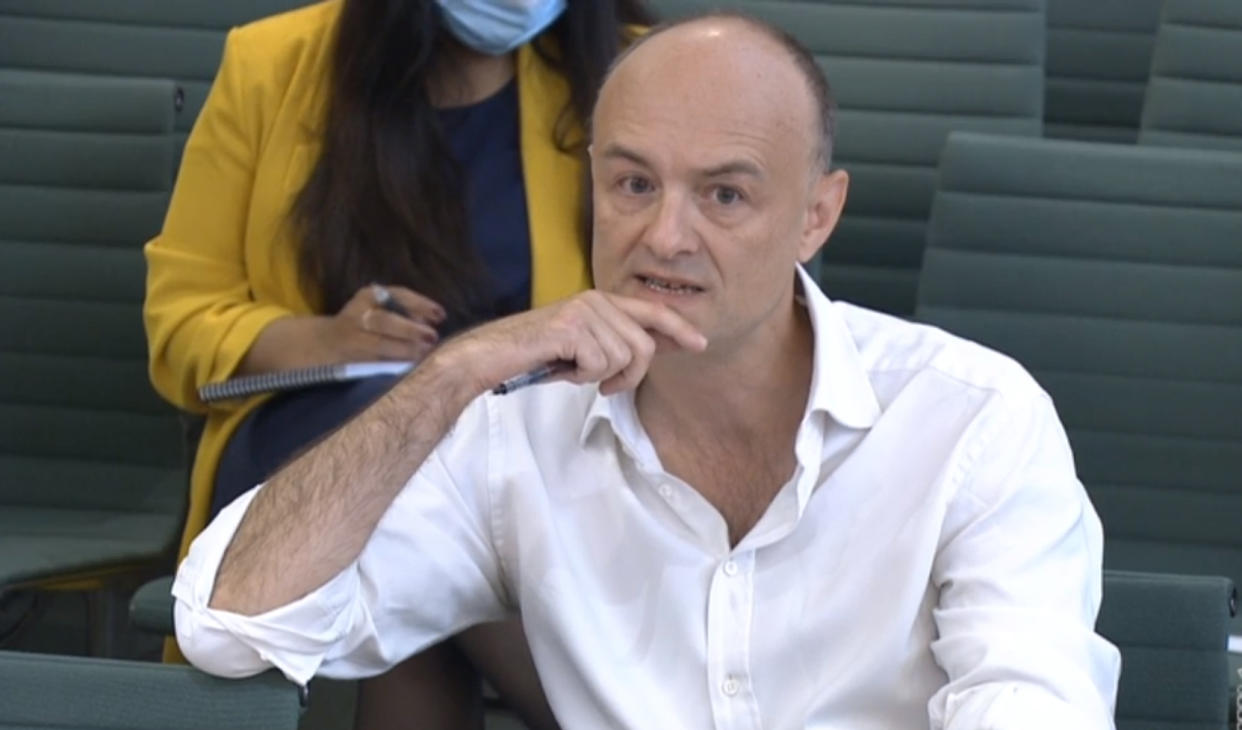Dominic Cummings says real reason for lockdown Durham trip was 'security concerns' over safety
Dominic Cummings has said the real reason for his lockdown trip to Durham was because of concerns for his family’s safety.
The former chief adviser to the prime minister said a death threat had been made against his family outside their London home.
Cummings has been giving evidence to MPs on Wednesday about the government's handling of the Covid-19 pandemic.
He told the joint science and health committee hearing that he had left out a "crucial part" of his explanation for going to Durham in his infamous interview in the 10 Downing Street Rose Garden on 25 May, 2020, almost exactly a year ago.

There was anger from the public last year when it emerged Cummings had travelled 260 miles from London to his parents’ home in Durham last March.
In April, he also made a 30-mile trip to Barnard Castle, claiming he was testing his eyesight to see if he was fit enough to drive back to London.
A year ago, Cummings had said he had headed north after his wife developed Covid-19 symptoms.
But on Wednesday, he revealed that security concerns had also been a factor.
Cummings told MPs he was “extremely sorry” about the episode, which “was definitely a major disaster for the government and for the Covid policy”, but said there were security issues he had not previously revealed.
He said in February his wife had told him there was a gang outside the family home “saying they’re going to break into the house and kill everybody inside”, and it was decided with the Cabinet Office after that – combined with press coverage with prompted more threats – that he would move his family out of London to his parents’ home in County Durham regardless of lockdown rules.
After his trip was reported by newspapers, he said: “The prime minister and I agreed that because of the security things, we would basically just stonewall the story and not say anything about it.
“I was extremely mindful of the problem that when you talk about these things, you cause more trouble for yourself, and I’d already put my wife and child in the firing line on it. So I said, I’m not talking about this, we should shut our mouths about it.”
Cummings said he made the “terrible, terrible, terrible mistake” of not sending his family out of London again and telling the whole truth.
“I ended up giving the whole rose garden thing where what I said was true, but we left out a kind of crucial part of it all,” he said.
“The whole thing was a complete disaster. If I just basically sent my family back out of London and said here’s the truth to the public, I think people would have understood the situation.
“It was a terrible misjudgment not to do that. The prime minister got that wrong, I got that wrong.”
Cummings said: “Hopefully, this is a case study of how not to handle something like this.”
When asked by the committee if it hadn’t seemed “crazy” to drive to Barnard Castle to test his eyesight, Cummings said: “If I was going to make up a story, I would have come up with a hell of a lot better one than that one, right? It’s such a weird story.
“The truth is only a few days before then I had been sitting in bed writing a will, what to do if I die.

“I tried to explain this all at the time, it seemed to me like, okay, if you’re going to drive 300 miles to go back to work the next day then pottering down the road for 30 miles and back to see how you feel after you have come off what you thought might be your death bed didn’t seem crazy to me at the time.”
He added: “Obviously, I wish I’d never heard of Barnard Castle, I wish I’d never gone.”
In his evidence to MPs on Wednesday, Cummings claimed Johnson wanted to be injected with coronavirus on live television and thought Covid-19 was a “scare story”, calling it the “new swine flu”.
Cummings also launched a blistering attack on Matt Hancock, saying he should have been sacked "15 to 20 times" for lying about the pandemic.
In addition, Cummings said it was "crackers" that Boris Johnson is prime minister.
Earlier, transport secretary Grant Shapps, who last spring defended Cummings's trip north, said it had “undermined” the government’s message.

Shapps told the BBC on Wednesday: “I thought he was right at the time to stand by his family, to go into effective quarantine, and that’s what he did.”
But he added: “I accept it was a moment which actually in the public’s mind undermined the wider messages and I accept that.
“I thought he was doing what he thought was right by his family at the time.”
Shapps acknowledged mistakes were made in the response to the pandemic but said the government was responding to an unprecedented situation.


